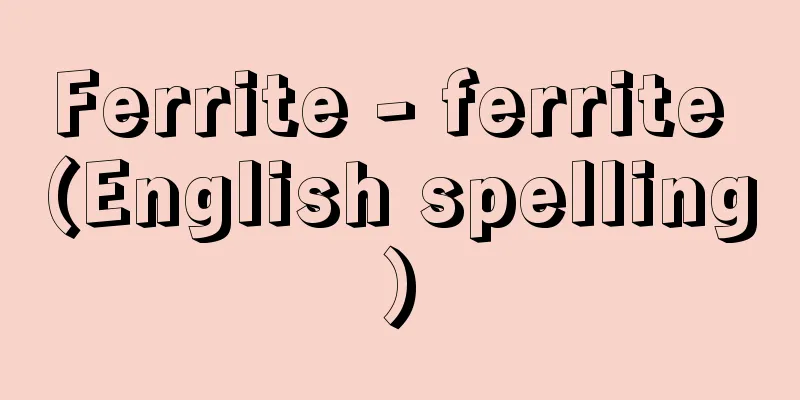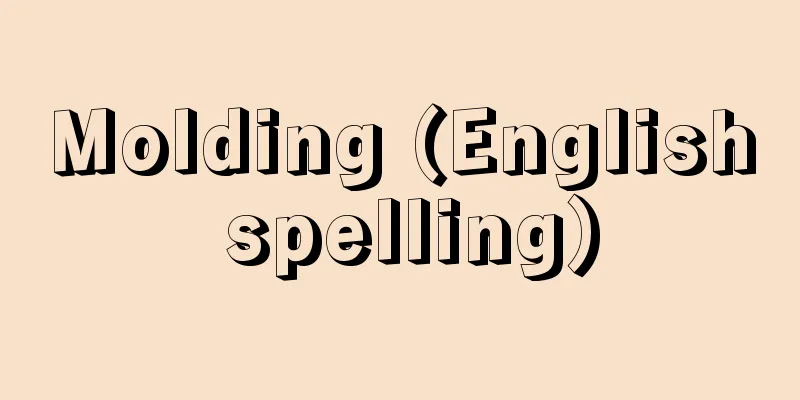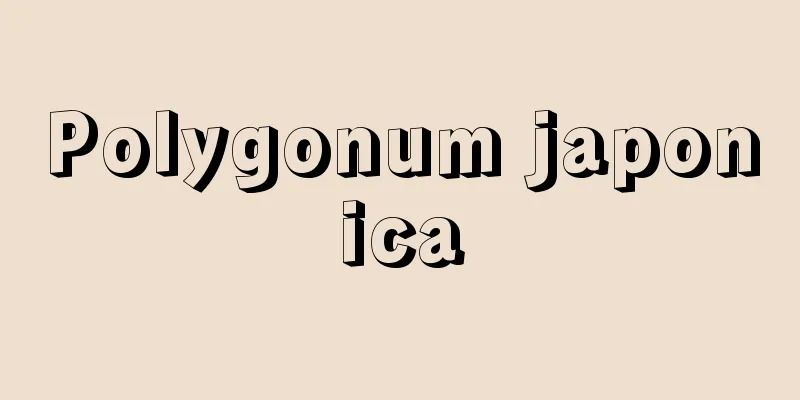Ferrite - ferrite (English spelling)

|
(1) A composite oxide of trivalent iron oxide ( Fe2O3 ) and divalent metal oxide (FeO, CoO, ZnO, BaO, etc.), used as a magnetic material. Magnetite ( Fe3O4 ), the main component of iron sand, is a ferrite composed of Fe2O3 and FeO . The typical crystal structure of ferrite is the spinel type, where oxygen ions form a face-centered cubic crystal lattice, and metal ions are arranged in tetrahedral positions surrounded by four oxygen ions, or in octahedral positions surrounded by six oxygen ions. By adjusting the type and composition of these metal ions, ferrite can exhibit a wide variety of magnetic properties. Moreover, because it is inexpensive, it is used in large quantities in magnets, magnetic tapes, etc. To manufacture ferrite, a mixture of oxides or carbonates is first sintered at high temperatures and then finely crushed to produce ferrite powder. This is mixed with a binder and applied to vinyl tape to produce magnetic tape. The powder can also be compressed in a press, sintered at high temperatures, and magnetized to produce a magnet. The development of ferrite began in 1932 (Showa 7, patent announcement) when Yogoro Kato and Takeshi Takei of the Tokyo Institute of Technology invented OP magnets (ferrite of Fe2O3 and CoO). Since then, various types of ferrite have been developed in various countries as a result of improving properties through composition control. (2) Body-centered cubic iron is called α (alpha) iron, or ferrite. When this is heated to a temperature of 910°C or higher, the crystal structure changes to face-centered cubic, becoming γ (gamma) iron (austenite). Steel materials are made from iron as the base material, and are alloyed with carbon, chromium, nickel, etc. to be prepared to perform according to the purpose. Steel materials that do not contain large amounts of added elements are adjusted to have a structure in which granular or plate-shaped carbides are distributed within α iron, or ferrite, as the matrix. This type of steel is collectively called ferritic steel. In contrast, steel adjusted to be mainly face-centered cubic austenite by adding large amounts of nickel and chromium is called austenitic steel. [Taiji Nishizawa] [Reference item] |©Takashi Aoki Ferrite metal ion arrangement and typical bonds… Source: Shogakukan Encyclopedia Nipponica About Encyclopedia Nipponica Information | Legend |
|
(1)3価の鉄の酸化物(Fe2O3)と二価金属の酸化物(FeO, CoO, ZnO, BaOなど)との複合酸化物で、磁性材料に使用されている。砂鉄の主成分のマグネタイト(Fe3O4)はFe2O3とFeOよりなるフェライトである。 フェライトの代表的な結晶構造はスピネル型であって、酸素イオンが面心立方晶の結晶格子を構成し、金属イオンは4個の酸素イオンに囲まれた四面体位置か、または6個の酸素イオンに囲まれた八面体位置に配列する。これらの金属イオンの種類と組成を調整することによって、フェライトは多種多様な磁気特性を示す。しかも安価であるために、マグネットや磁気テープなどに大量に利用されている。 フェライトを製造するには、まず、酸化物または炭酸塩の混合物を高温で焼成し、細かに粉砕してフェライト粉末をつくる。これを結合剤と混ぜて、ビニル・テープに塗布したものが磁気テープである。また、粉末をプレスで圧縮成型して高温で焼結し、磁化するとマグネットが得られる。 フェライトの開発は1932年(昭和7、特許公告)東京工業大学の加藤与五郎と武井武がOP磁石(Fe2O3とCoOとのフェライト)を発明したことが端緒となり、それ以後、各国において組成制御による特性向上が行われて、各種のフェライトに発展した。 (2)体心立方晶の鉄をα(アルファ)鉄、またはフェライトという。これを910℃以上の温度に加熱すると、結晶構造が面心立方晶に変化して、γ(ガンマ)鉄(オーステナイト)となる。鉄鋼材料は鉄を基本素材として、これに炭素、クロム、ニッケルなどを合金させて、目的に応じた性能を示すように調製されている。添加元素があまり多量でない鉄鋼材料は、α鉄すなわちフェライトを基質(マトリックス)として、その中に粒状または板状の炭化物が分布したような組織に調整される。この種の鋼をフェライト鋼と総称する。これに対して、ニッケルやクロムを多量添加して、面心立方晶のオーステナイトが主体となるように調整した鋼をオーステナイト鋼という。 [西沢泰二] [参照項目] |©青木 隆"> フェライトの金属イオン配列と代表的な結… 出典 小学館 日本大百科全書(ニッポニカ)日本大百科全書(ニッポニカ)について 情報 | 凡例 |
<<: Ferrara (English spelling)
Recommend
The origins of the mountains
This is a record of the origins and history of Mou...
Goseibai Shikimoku - Rules for punishing enemies
Fifty-one Articles August 1st, 1999 (excerpt) 1. ...
hektēmoroi (English spelling) hektemoroi
...He gained fame by encouraging the citizens in ...
Mikanohara
The name of the northern part of Kamo-cho, Soraku-...
crystalline
...In other words, the type of symmetry is an iss...
Fujikawa Yu
A medical scientist and medical historian. Born o...
migration potential
…It was discovered in 1878 by E. Dorn of Germany....
Mount Yoshino
<br /> A mountain range in Yoshinoyama, Yosh...
Griffith - David Wark Griffith
American film director. Born January 23rd in Cres...
Lampropeltis triangulum (English name) Lampropeltistriangulum
...In areas where coral snakes live, there are sp...
Contemplation
…In Western languages, it is called contemplation...
Mold (India) - Mold
...Indian mythology is generally divided into the...
Image (in English)
From the Latin imago (image). It means mental imag...
Fixed Universal Time - Fixed Universal Time
…Relevant observatories around the world observe ...
Radio Law - Denpaho
The purpose of this law is to promote the public ...









